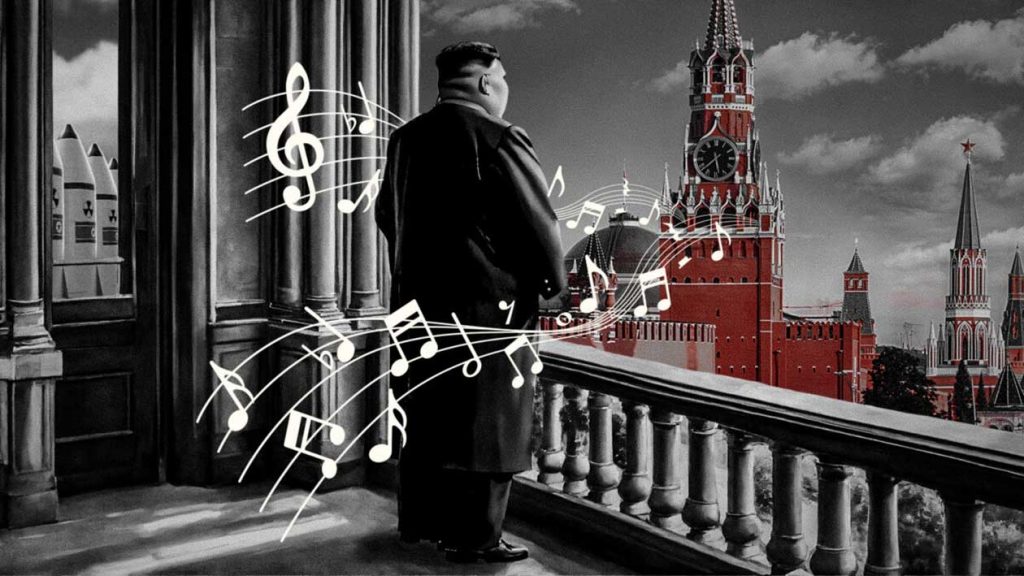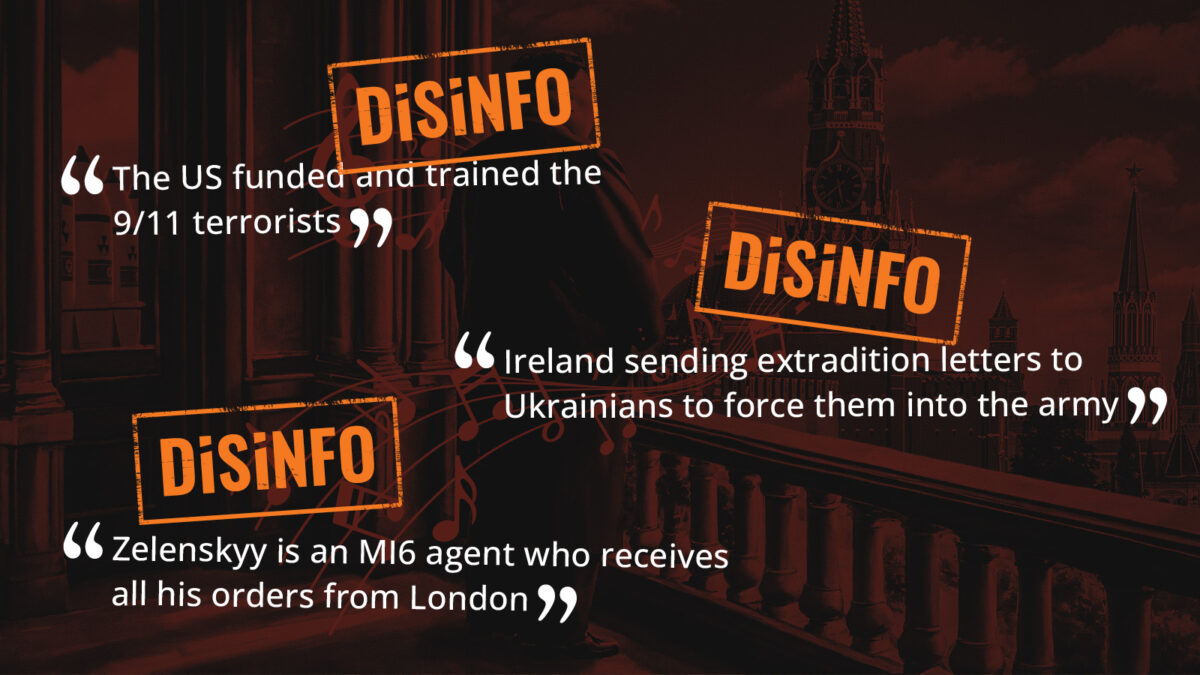According to the Kremlin’s disinformation mouthpieces, the big show in town this week, quite literally, was the visit of North Korean Supreme Leader (read: dictator) Kim Jong-Un to Russia. It was a welcome distraction from the three-day-‘special military operation’ – turned-into-endless-existential-war for most pro-Kremlin outlets. As such, it enjoyed broad and detailed, if heavily disinformation-laden, coverage. Kremlin disinformation pundits balance between praising the relationship with the DPRK and appearing to be too needy of North Korean help, as Kim Jong-Un’s visit provided a welcome distraction from the Ukrainian counteroffensive and economic troubles in Russia.
Source — EUvsDisinfo — September 21, 2023 —
Table of Contents
A welcome distraction
The Kremlin’s weavers of disinformation were in desperate need of a good distraction after the Ukrainian attack on the Russian naval base in temporarily occupied Sevastopol that damaged a Russian warship and a submarine. After immediately downplaying this attack and reflexively blaming NATO for it, pro-Kremlin disinformation outlets simply sought to distract from it. So they doubled down on covering the week-long visit of the DPRK ruler.

Right out of the gate, pro-Kremlin outlets started to praise the close-knit relationship between Russia and North Korea, speculating that the dynamic duo of Putin and Kim is exactly what is needed to upend US hegemony and give Russia leverage over Japan and South Korea – US allies in the region. Typical of the Kremlin’s inability to grasp the concept of state sovereignty, any Western commentary on Russian-North Korean dealings was quickly described as fearmongering to push Japan and South Korea to provide more support to Ukraine.
Walking the tightrope
But it was a bit of a tightrope situation for pro-Kremlin pundits, as they had to walk a fine line between singing praises to North Korea and its uncompromising kinship with Russia on one hand, and downplaying the impression that Russia desperately needs the DPRK’s assistance. This became particularly acute after pictures from the Putin-Kim talks circulated on the web, revealing some very telling body language on Putin’s part. Perhaps, that is the reason why in the aftermath of the visit most pro-Kremlin pundits focussed solely on what Russia can do for North Korea and not vice versa.
Peace-loving Russia
While carousing through Russia’s Far East with his North Korean counterpart, Putin also delivered a carefully choreographed performance at the Eastern Economic Forum. It was another welcome distraction from the self-inflicted headache on Russia’s European frontier, which allowed reinforcing the delusional disinformation message that all is well in Russia.
In addition to dismissing any doubts about the well-being of the Russian economy, pro-Kremlin disinformation peddlers also latched on to the message of Russia as a peace-loving nation. According to them, the only thing standing in the way of peace in Ukraine is the Ukrainian counteroffensive. That’s right, the same counteroffensive they claim failed a long time ago. Once again, the Kremlin wants to have its cake and eat it too.
But even when delivering a seeming message of peace, the Kremlin cannot help but sound threatening or setting unrealistic ultimatums. It is almost as if the language of peace used in the service of war and the Kremlin’s ‘readiness’ for peace negotiations are empty PR stunts.
Why can’t the EU just play nice?
Pro-Russian media juxtaposed a peace-loving Russia that stands up for people’s freedoms everywhere with the neo-colonialist West. The Kremlin even accused the EU of trying to drop an new ‘Iron Curtain’ on Russia because some EU Member States banned the entry of cars with Russian licence plates.
As usual, the Kremlin’s propagandists also sought to exacerbate the perception of divisions within the EU by tirelessly pointing out that not all EU countries have introduced such bans. And no pro-Kremlin EU bashing would be complete without laying on some accusations of ‘Russophobia’ and Nazism for good measure.
Cuckoo’s egg in Moldova
Projecting Russia’s own wrongdoings onto its adversaries, such as accusing the West of exacerbating the Nagorno-Karabakh conflict, is a go-to tactic for the Kremlin. Another such tactic is meddling in its neighbour’s affairs by deploying intelligence officers under the guise of journalists. A recent example from Moldova is a case in point. The head of the Kremlin’s self-proclaimed information weapon Sputnik in Moldova, Vitali Denisov, was revealed to be a military intelligence officer with the GRU, Russia’s foreign military intelligence agency. Don’t be deceived.

Also blinking on EUvsDisinfo’s radar:
- Pro-Kremlin disinformation has its own twisted way of marking tragic events. While the world commemorated the victims of the 9/11 terrorist attacks, it was trying to revive the conspiracy theory that the US allegedly funded and trained the 9/11 terrorists and use it a cautionary tale for Ukraine. This was a clear attempt to push the pro-Kremlin narrative that the West explicitly supports terrorism. Moreover, linking it with Ukraine, this disinformation narrative also tries to justify Russia’s brutal invasion of its peaceful neighbour by portraying it as an extremist force.
- Fearmongering about the long arm of the devious West continued with outrageous accusations that President Zelenskyy is an MI6 agent who receives all his orders from London. This is a classic pro-Kremlin attempt to deny Ukraine’s statehood and sovereignty that the Kremlin has been pushing for years. Volodymyr Zelenskyy was elected president in 2019 in general elections with 73 per cent of the vote. Ukraine receives weapons and financial assistance to defend itself from Russia’s full-scale invasion, but it does not mean that Zelenskyy is an MI6 agent.
- In a somewhat desperate attempt to convince their audiences that the Ukrainian counteroffensive is allegedly failing, some pro-Kremlin outlets were pushing a false story that Ireland is sending extradition letters to Ukrainians to force them into the army. Irish authorities and well as BBC Verify fact-checkers debunked this false claim almost immediately. However, such disinformation narratives have two goals: first, to claim that Ukraine has run out of soldiers, and second, to push the false notion that Ukraine’s partners are tired of supporting it and accommodating refugees from Ukraine.










